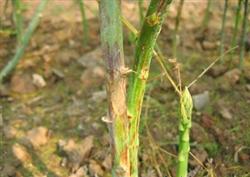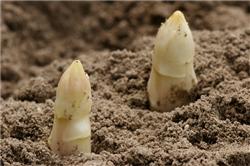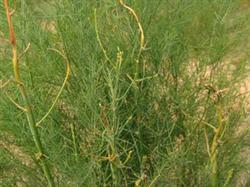Comprehensive prevention and control of asparagus diseases and insect pests

In the prevention and control of diseases and insect pests, scientific control measures should be adopted, pollution-free control technology should be vigorously promoted, and pesticides with high toxicity and high residues should be banned, so as to not only effectively control the harm of diseases and insect pests, but also make the pesticide residues in the products do not exceed the standard. In the prevention and control, take "prevention first, comprehensive prevention and control" measures, timely early prevention. (1) Agricultural prevention and control: before asparagus harvest, the old mother stem was cleared on a sunny day before "the Beginning of Spring" and "the Beginning of Autumn" respectively, and a thorough garden cleaning was carried out to eliminate the sources of diseases and insect pests lurking in litter and soil. Clear the garden to cut off the old mother stem and the new tender stem with deformities, diseases and insect pests, remove them from the field and burn them; at the same time, spray herbicides to remove weeds in the field, and peel off the sand from the head of asparagus to remove the residual stems, after exposure to the sun for 1-2 days, every 667m2 with 70% methyl thiophanate and 50% carbendazim 0.5Kg, phoxim 1Kg mixed with water 500-600Kg, then covered with 5-6cm guest sand to eliminate the source of diseases and insect pests. Strengthen the management of fertilizer and water, increase the application of organic fertilizer, and pay attention to the reasonable collocation of nitrogen, phosphorus, potassium and trace elements. If the soil of bamboo shoot garden is slightly acidic, appropriate amount of lime powder can be applied to adjust soil acidity and alkalinity; pay attention to drought and drainage, promote plant growth and strengthen disease resistance; do not harvest too much to avoid premature senescence. (2) Chemical control: the key period of chemical control should be grasped, stem blight and other diseases should be controlled at the initial stage, and the susceptible period from mother stem germination to maturity should be protected. For pests, it is necessary to control the peak hatching period of larvae to young instar. After clearing the garden, the young stems began to spray to control stem blight as soon as they grew out, and the spraying should be persisted until the stems and leaves were aged. Agents should be used in rotation frequently, and do not use a single agent for a long time, so as not to produce drug resistance and affect the efficacy. 1. Mother stem growth period: appropriate selection of pesticides with high efficiency, low toxicity and low residue, such as Dasheng Mmur45 wettable powder or 65% Haoshengling wettable powder or 70% methyl thiophanate wettable powder or 50% carbendazim wettable powder, or 80% Shengsheng wettable powder 300 times, or 65% Sensen ammonium water solution 800-1000 times to control stem blight and brown spot. Spray 1000-1500 times of Yitaibao EC or 1000 times of 90% cypermethrin EC plus a small amount of dimethoate or 2.5% deltamethrin EC mixed with dimethoate or hit 3000 times to control Noctuidae pests: control aphids and thrips with 1000 times of 10% great heroes or 1500-2000 times of imidacloprid wettable powder The occurrence of mites and red spiders can be prevented by spraying 1000 times of mites EC. 2. Harvest time: biological control should be carried out. Biological agents such as 1000-fold solution of 12% Dianlikang or 1000-fold solution of Kexikang can be used to control stem blight; 1000-fold liquid of Beauveria bassiana or Bacillus thuringiensis or 1500-fold liquid of rice were used to control pests of Spodoptera litura and other moth pests; avermectin biological pesticides were used to control aphids and thrips. Sugar and vinegar solution (3 parts of sugar, 3 parts of vinegar, 1 part of wine, 10 parts of water plus 0.1% of trichlorfon) can be used to trap and kill adults in the field in the evening.
- Prev

Asparagus sowing and management after sowing
First, sowing time is to make use of the longest growing season, sowing as early as possible in spring. The sowing time should be 18 ℃ 20 min after the frost period. The higher the ground temperature, even up to 32 ℃, the faster the sprouting. Sowing too late in the growing season can lead to smaller mother plants. So if you sow too late in the growing season, do your best.
- Next

Control techniques of asparagus diseases and insect pests
Asparagus stem blight and brown spot are the main diseases of asparagus. At present, there is no specific medicine for prevention and treatment. Practice has proved that the comprehensive disease prevention strategy based on agronomic measures supplemented by chemical control can achieve twice the result with half the effort. The specific methods are as follows: 1. Timely heart-picking to prevent lodging. Gourd.
Related
- Where is it suitable to grow horseradish in China? it is expected to see the middle altitude horseradish in Alishan.
- How to prevent tomato virus disease reasonably? (Control methods included)
- Many people like to plant towel gourd on the balcony. What are the main points of this method and management?
- What crops can chili peppers be mixed with?
- Fertilization techniques and matters needing attention in Tomato
- What are the grafting techniques for peach seedlings in spring?
- Harm and control methods of root swelling disease of Chinese cabbage
- What are the pests of sweet potatoes? How to prevent and cure it?
- Symptoms, causes and Control methods of navel Rot in Tomato
- The cause of "Cucumber rotten bibcock" in Farmers' planting Cucumber and its Control Plan

